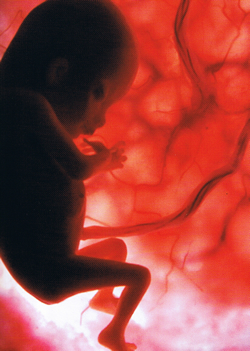What to Expect This Appointment?
Week 23 is a milestone week. This is due to the fact that a child born after 23 weeks has a chance for survival. Children delivered at 23 weeks have a 25-33% of survival with the right medical intervention. While these odds might not seem favorable, a small chance is better than none at all. The baby is 11.5 inches and weighs right at 1 pound. This week is a standard ultrasound. Many parents watch their baby move around on the ultrasound monitor. This week the doctor might insist on checking blood sugar levels in expectant mothers whom are diabetic, or show potential signs of developing diabetes. Blood pressure will also be monitored to ensure that the mother doesn’t seem to be developing preeclampsia. Many parents might choose to schedule 3D or 4D ultrasound, which allows parents to get a better idea of what their baby looks like during development.What is Developing?
Before week 23, the fetus was covered with a translucent skin. This translucent skin now develops into a mature skin. Fat continues to accumulate providing warmth and protection for the fetus. Keratin is being produced during this week, which allows the skin to toughen up. The lungs are prepared for the real world after 23 weeks. Pneumocytes and capillary vessels are developed. The vestibular area of the brain, that coordinates movement, develops further. The inner ear bones are maturing, with their maturity the baby will experience an increase in balance and coordination later in their lives.Mommy Tips
This week, moms should be on the lookout for any type of spotting with or without symptoms. Symptoms to watch out for would be pelvic pain, abdominal pain, nausea, and backache. These are signs of preterm labor and should be considered serious. Women that experience these symptoms will most likely be put on bed rest or monitored more closely throughout the remainder of their pregnancy. Headaches shouldn’t be taken lightly either. Persistent headaches, tiredness, heart palpitations, and shortness of breath are all signs of preeclampsia. Talk to your doctor if you are considering travelling during the pregnancy. When you are pregnant, there are additional vaccinations and preventatives that need to be taken into consideration to ensure the health of both mother and child. Mothers are reminded that the term eating for two doesn’t mean gorging yourself at the buffet. Mothers need to consume 300 extra calories a day to ensure healthy development. Eating fresh fruits and vegetables can help keep you hydrated, reduce headaches, reduce constipation, and help prevent hemorrhoids. Trying to sleep during pregnancy is harder than it looks. Throughout the second and third trimester, a comfortable night’s sleep is almost impossible. Lying on the left side of your body and putting a pillow between the legs could help provide the comfort needed to get some sleep. Lying on your stomach or back restricts placenta blood flow, which causes discomfort for both you and the baby.Week 23 Pregnancy Ultrasound



